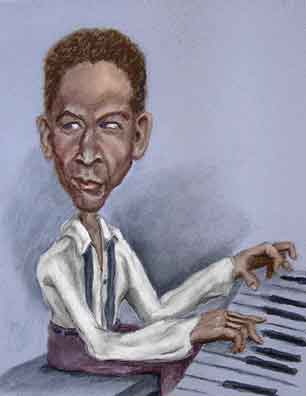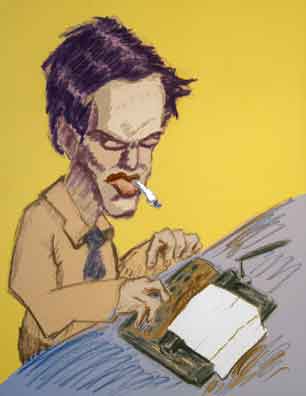Jelly Roll Morton
A CooperToons Brief, Very Brief, and
Perhaps Not Overly Merry and Illustrated
Biography

Jelly Roll Morton
Born Ferdinand Joseph Lamothe, Jelly Roll Morton may not have invented jazz as he said, but he was quite a force in the early days of the genre, writing hundreds of compositions and making some of the earliest jazz recordings. But by the 1930's he found himself increasingly out of style as "hot" jazz began to meld into swing. Work became harder and harder to find, and as the decade drew to a close, he found himself playing in sleazy bars just to scratch by.
But in 1938 Alan Lomax, the folk song collector who was now the director of the Archive of American Folksong at the Library of Congress, invited Jelly in to do some recorded interviews. Jelly, who in most of the interviews sat at and played the piano, comes off as highly articulate and intelligent, but it seems he was hanging around with a pretty fast crowd as a youngster - either that or his timing is off. For instance, he said in 1902 he was seventeen and would go to nightspots to listen to the jazz players when they got off working at the sporting houses. In 1902, Jelly was twelve.
Also Jelly's singing and tales got distinctively more ribald as an interview progressed. Of course, Alan was known to use liquor as an effective tool in folk collecting, which Jelly clearly appreciated. So at the beginning of an interview Jelly might object to venturing into the more risqué lyrics because a lady was present (Alan's collaborator and wife, Elizabeth, was usually there), with the good whiskey so generously provided, before long Jelly was singing songs that even today couldn't find their way into most print media, much less on the airways). You wonder, too, how many of the lyrics he said he was "remembering" were improvised on the spot.

Alan Lomax
When interviewed himself in the 1980's, Alan admitted that as a folk music collector, he had thought of Jelly - a (gasp!) jazz musician - as an enemy to the cause. But Jelly began playing jazz when the distinction between jazz, ragtime, and the blues had yet to be clearly defined and it really was a folk phenomenon. And it was the success of the interviews with Jelly that two years later prompted Alan to interview and record another at at the time largely unknown musician - Woody Guthrie.
Jelly died in 1941 in Los Angeles at the age of fifty-one, possibly from complications from a negligent medical treatment for a stab wound a few years earlier. Or that's one story, anyway.